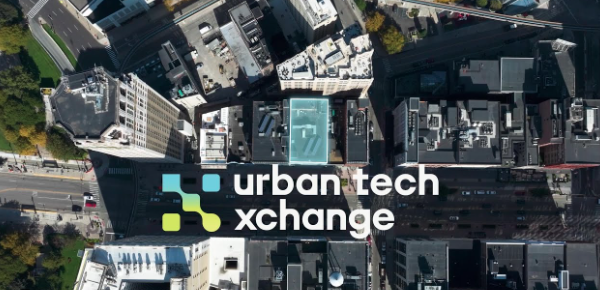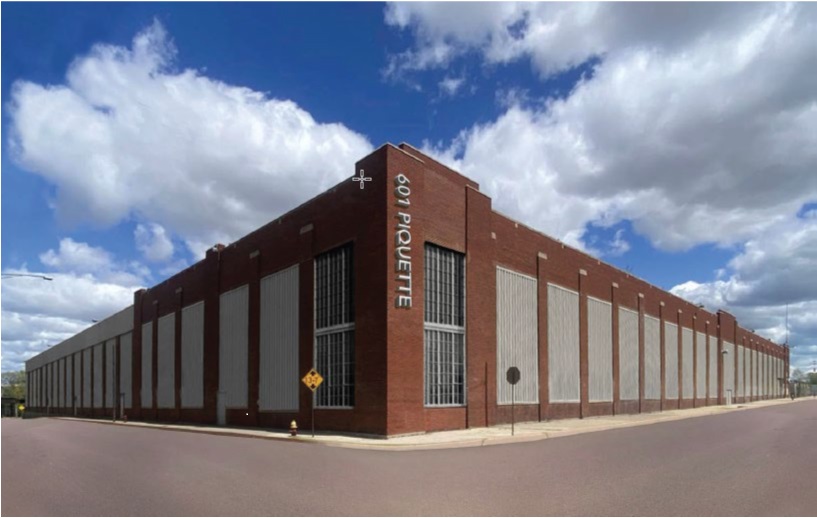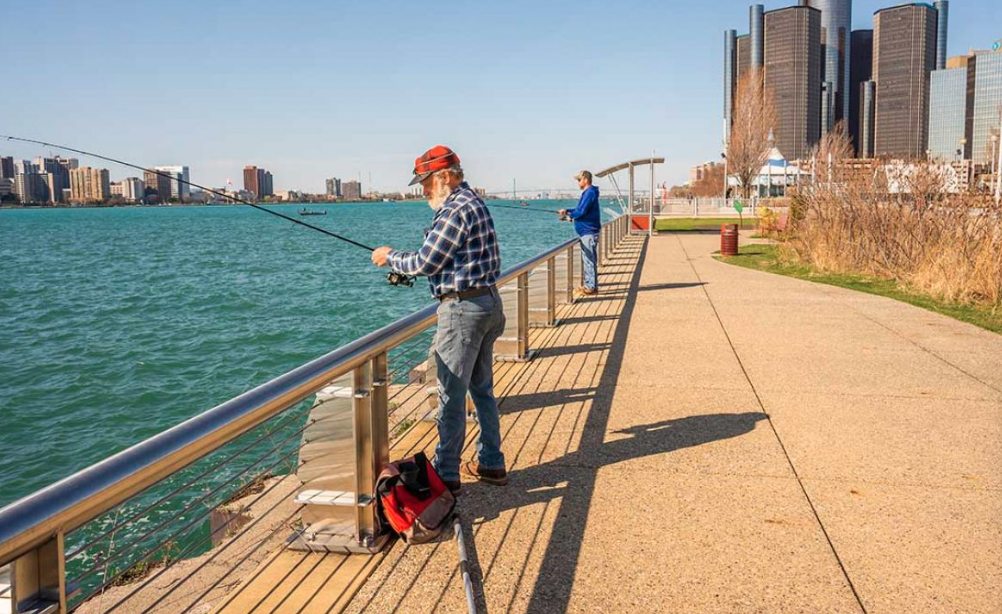Urban Tech Xchange Facilitates Real-World Testing to Create Sustainable Urban Solutions

Nearly six months ago the Urban Tech Xchange (UTX) launched in Detroit – an innovative lab hosting a series of startups to advance smart city technologies. UTX is a collaboration between Bedrock, Bosch, Cisco, and KODE Labs and is operated by NextEnergy. The space provides a real-world test facility for the progression of sustainable urban solutions. Kevin Mull, senior director for the Office of Urban Strategy and Innovation at Bedrock, sat down with SBN Detroit to discuss the work being done there. Q: Impetus behind UTX? A: In 2021 Bedrock worked with Bosch, Ford, and the Michigan Economic Development Corp. (MEDC) to launch the Detroit Smart Parking Lab (DSPL) at our Assembly Parking Garage. This lab was specifically designed to accommodate open innovation, allowing startups to quickly and effectively deploy early-stage mobility technologies in a real-world testing environment. The concept has worked so well that we began to think about what’s next… being Detroit’s largest real estate developer, it made sense to try to apply those same methods to developing and deploying technologies for the built environment. The DSPL’s focus is mobility and transportation, which in many ways is dependent upon infrastructure, so the Urban Tech Xchange (UTX) was its natural progression. Q: In what ways does UTX help to foster a more resilient Southeast Michigan? A: I think it brings attention to the region’s entrepreneurial spirit and helps define Detroit as a place for innovation while adding another layer to its creator ecosystem. It also gives us a chance to further collaborate with stakeholders here in Southeast Michigan. Between the DSPL, TechTown, Michigan Central, Centrepolis Accelerator, and others like those, and our universities and colleges, and now UTX, we have an emerging set of platforms for continuing to attract and cultivate new ideas and advance open innovation throughout the state. Q: Why the combination of Bosch, Cisco, Bedrock and KODE Labs? A: Bosch and Bedrock are natural cofounders as they have complementary business concepts. Bosch is a lead innovator in energy and building management, while Bedrock is a city builder whose development projects throughout the central business district range from residential and commercial development to hospitality and retail. Cisco is a globally recognized brand and a huge player in smart infrastructure deployment, while KODE Labs is uniquely positioned as a Detroit-based startup focused on smart building technology that has recently experienced tremendous growth. The four companies together bring all the expertise for supporting a sustainable innovation platform, and importantly, maintain a strong Detroit presence. Q: How will Bedrock data be used to design sustainable solutions? A: This is the first-in-the-world kind of opportunity that’s driven by the uniquely dense portfolio we have in Detroit. We have this construct we are working on called a data lake, which is the aggregation of the data that comes from Bedrock’s 17 million square feet of real estate across Detroit. Its access to this unique operational data, combined with publicly accessible information like that from Census Data and the U.S. Energy Information Administration, provides lab participants with the unique opportunity to tie into a broad real estate ecosystem. We encourage and want anyone who engages with UTX to integrate their data as well, and under the right governance, we can offer this data lake to third-party developers for innovation. Q: In what ways are energy usage and decarbonization being looked at? A: Technologies like those being tested and deployed through the UTX platform allow us to track energy usage in real-time and better understand asset optimization. This provides us with the ability to cut back quickly and efficiently on carbon intensity. For example, heat pumps are a great technology but in certain situations, traditional heating systems might actually create less carbon. Real-world and real-time testing will help reveal this. The more data we get, the better decision-making we have and that can support AI applications as well. So first, it’s about understanding where a building is using energy, then understanding how the building responds to energy usage profiles. Q: Elaborate on how UTX is forming best practices for ensuring equity in urban tech solutions. A: When we set out to develop UTX we engaged several stakeholders such as community organizations, local government, public schools, and other platforms to all weigh in. Our work is fully transparent and there is a lot of communication in terms of where we are applying the technologies. For example, we are currently deploying tech in an area of Detroit to better understand air and noise pollution. We are working side-by-side with the community to make sure businesses and residents understand where we are doing this, how we are doing it, and in what ways the information will be used. Communication is paramount when trying to achieve equity in tech deployment. Q: In what ways does all of this work being done here impact businesses in Southeast Michigan? A: I look at it as a bidirectional flow. By establishing the UTX platform, we are helping to attract the best and brightest to deploy their innovations locally. Conversely, established local businesses have the opportunity to plug into a platform that provides a potential global spotlight. Q: What are some examples of new technology that’s being developed there? A: There are several examples of building automation systems, such as using smart blinds that automatically adjust to provide maximum natural sunlight based on occupancy and interior temperature. What I find very interesting are new systems for tracking and automating accessibility. One such deployment is smart communication between power wheelchairs and elevators. … The elevator is automatically called when the wheelchair arrives! Q: Do you think UTX is a differentiator for Detroit? A: Yes. Again, it puts Detroit on the map as a place that’s committed to, and capable of driving innovations and setting benchmarks and best practices for sustainable urban solutions. UTX is putting a stake in the ground for sustainable tech in an urban environment. Detroit is where the innovation is happening. Be sure to subscribe to our newsletter for regular updates
Global Green Energy and Metals Company Chooses Detroit for its First U.S. Advanced Manufacturing Center

The former Fisher Body Plant on Piquette Avenue in Detroit has been chosen by Fortescue, a global green energy and metals company, as the location for its first U.S. Advanced Manufacturing Center. The facility will bring roughly 560 manufacturing and engineering jobs to the area focused on the production of automotive and heavy industry batteries, hydrogen generators, fast chargers, and electrolyzers. The project received incentives from The Michigan Strategic Fund, including a $9 million Michigan Business Development Program performance-based grant; a 15-year, 100% State Essential Services Assessment exemption valued at $1,300,950; and state tax capture valued at $2,374,413, for reimbursement of brownfield activities at the site. The project also is requesting $5,247,422 in tax-increment financing from the Michigan Department of Environment, Great Lakes, and Energy to assist with environmental-eligible activities. SBN Detroit interviewed Josh Hundt, MEDC’s Executive Vice President and Chief Project Marketing Advisor, about the role Fortescue will play in Michigan. Q: Fortescue chose Detroit Michigan for its first U.S. Advanced Manufacturing Center. What do you think this says about Southeast Michigan in terms of sustainability and manufacturing? A: It says that Michigan and Detroit are at the global epicenter of the mobility industry. Having put the world on wheels 120 years ago, Detroit is the birthplace of the automotive industry and it is also the industry’s future. This also clearly points to the fact that companies have a desire and need to be in Detroit for these types of opportunities. Q: Tell me about Fortescue. A: Fortescue is a global green energy company that plans to breed manufacturing practices and clean energy growth through its center here. Its goal is to be the number one green tech and metals company in the world. Q: What role did MEDC play in bringing Fortescue to Detroit? A: MEDC helps to grow companies already in the state while attracting new businesses to Michigan. Fortescue looked at 99 sites across twelve states, considering many variables such as labor cost, availability, cost of business, speed to come to market, and more. We’ve worked with them since they announced their decision to build in the U.S. to secure the right space for them in Michigan. Q: Fortescue’s CEO, Mark Hutchinson, said, “Fortescue’s Advanced Manufacturing Center will breathe fresh life into the birthplace of the automotive industry.” What are your thoughts on this? A: Michigan, Detroit, and the old Fisher Body Plant are all steeped in automotive heritage and legacy, and we can utilize that legacy of engineering, and research and development, and manufacturing to build the future of clean energy, advanced manufacturing, and mobility. This is an opportunity to move the industry, state, and community forward. Q: Why Detroit? A: Fortescue can leverage the 120 years of experience we have in Detroit to build a bridge to the future. Nearly three-quarters of U.S. automotive research and development takes place in Michigan. We lead the production of EV battery production. We have an existing supply chain and strong industry here. Fortescue also strongly considered ‘place.’ This community is in the midst of a transformation in terms of how investment is happening, and it’s a community of people who are skilled and educated to fill the roles the company will need. Q: How do you think Fortescue will impact other businesses in Southeast Michigan? A: Every time we see a company make an investment like this, it has a strong ripple effect on the industry, city, and region. This demonstrates that companies from around the world see Detroit as the future of mobility and advanced manufacturing. Fortescue will create 560 new jobs and is making a $210 million investment. This will help increase property values, and it’s an opportunity to develop the supply chain much further. This is great news for the industry and the community. Q: How do you think it will impact the economy? A: First it will create 560 jobs. Second, it furthers Michigan’s strength in the mobility sector while highlighting that we are the center for advanced manufacturing and clean energy. Third, this investment will also bring new tax revenue and new opportunities for suppliers to have growth occur here in Detroit. And finally, their presence will impact restaurants and venues in and around the community for additional growth. Q: What role do you think Fortescue will play when it comes to sustainability in Southeast Michigan? A: I think the biggest thing is the role they play in showing leadership – demonstrating that a company can have a great economic impact with job creation and investment and do it in a way that also puts sustainability and the environment at the forefront. And, their choice to renovate and utilize the old Fisher Body Plant speaks volumes because it shows that a facility can be reimagined and transformed for the future. This is an investment in a century-old building being leveraged to take us forward. Q: What does the future of Southeast Michigan look like with Fortescue as a part of it? A: Fortescue will be part of a strong mobility landscape and a part of the overall story of how Southeast Michigan is positioned to remain the global leader of the mobility industry. We’ve seen the success of projects around innovation and investments – like Nel and Plastic Omnium – that have positively impacted Southeast Michigan. This is a project that will put people in sustainable jobs, revitalize the area, boost the economy, and facilitate green energy for the future. It is a win for everyone. Be sure to subscribe to our newsletter for regular updates on sustainable business practices in and around Detroit.
With 110,000 Jobs and $5 Billion in Wages, Michigan’s Outdoor Rec Industry Continues to Grow

With 36,000 miles of rivers and streams, 20.3 million acres of forests, 1,300 miles of designated mountain bike and bicycle trails, 6,500 miles of snowmobile trails, and more than 600 campgrounds, Michigan has a lot to offer in the way of outdoor recreation. These resources provide connections with nature and opportunities for a healthier lifestyle, and they support Michigan’s economic growth with more than 7,000 outdoor recreation industry companies that include manufacturers and retail and service-sector businesses. And the goal is to continue growing. “When you put Michigan’s outdoor rec growth stats next to the fact that Southeast Michigan is one of the best places for entrepreneurship and venture capital, it becomes about how do we exemplify this and amplify it and bring and support talent here toward even more growth,” said Brad Garmon, director of the Michigan Office of Outdoor Recreation Industry of the Michigan Economic Development Corp. Gov. Gretchen Whitmer created the office in 2019 to focus on the outdoor economy, and the same year, the state joined the Confluence of States (COS), a bipartisan coalition of states dedicated to cultivating strong outdoor recreational economies while preserving land and other natural resources. Garmon, the coalition’s incoming chair for 2023, said the coalition’s four areas of focus align with Michigan’s goals of developing a sustainable future: Economic development, workforce and education, public health and wellness, and conservation and stewardship. “There is inherent connectivity between the outdoor recreation industry and building a sustainable future – a sustainable Michigan,” Garmon said. “We are leaning into the four COS areas of focus to create jobs, strengthen the economy, and promote physical activity while also being stewards of our wetlands, waters, forests, trails, parks, and natural resources.” The added infrastructure points to the growth in the outdoor recreation economy. According to the Michigan Economic Development Corp. and the U.S. Bureau of Economic Analysis: Michigan’s outdoor recreation economy grew 15.4% from 2020 to 2021 and is up 30 percent since 2012. The outdoor recreation industry employs nearly 110,000 people in a wide range of occupations and skills, including design and manufacturing, retail sales, and hospitality, accounting for $5 billion in wages and salaries. More than 7,200 of Michigan’s outdoor recreation jobs are in manufacturing, such as boating, RV, and gear manufacturing. The outdoor recreation economy also impacts local retailers across the state to the tune of $3.5 billion, accounting for 32% of the total value-add impact. Retail jobs supporting outdoor recreation totaled over 41,000 in 2021. The value-add is the difference between sales receipts plus other operating income and inventory change and production costs. And more growth is the plan. “We are working on identifying how we can add jobs, and also bring companies in from out of state,” Garmon said. He points to the bike industry as an example, saying, “I attended a bike industry summit recently and a large area of discussion focused on the fact that manufacturing is mostly overseas, and that the legacy of bicycle production in the U.S. has been lost. By pointing them to the manufacturing and engineering expertise in Michigan this creates a pathway for opportunity and a win/win for all.” Another area of interest for Michigan is the electrification of motor sports vehicles. “This industry is looking at and thinking about an electric future now, and our innovation in this area could bring big opportunities and more business,” Garmon said. Given that Michigan is also being recognized as a destination for startups and venture capital investment, the implication of opportunity gets even stronger. In fact, Detroit is the No. 1 emerging startup ecosystem globally, according to newly released rankings from Startup Genome’s 2022 Global Startup Ecosystem Report (GSER). When you consider that Detroit has also been recognized as one of the best travel destinations in the world, one of Time’s ‘Worlds’ Greatest Places’, and the Riverwalk is consistently voted best in the America, Detroit becomes even more interesting. Garmon shares, There is this antiquated idea that recreation only happens in wild or natural places, but Detroit is demonstrating that recreation happens everywhere. The Dequindre Cut, Belle Isle, the Riverwalk, and our parks all support quality of life and activity and recreation in Detroit. He added: “You don’t have to be on a trail or working in the wilderness to apply work skills and/or enjoy life. We are getting better at telling Detroit’s story and talking about Michigan’s assets and not living in the shadows of places like Colorado – we are now standing right next to them.” Be sure to subscribe to our newsletter for regular updates on sustainable business practices in and around Detroit.


